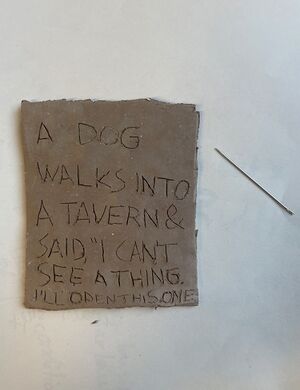User:ØverLørd/Ancient wisdom
Early in my career at the PZI I attended the station-skill course at the ceramics station. I have previously messed around with clay in a previous art-education. I like the bodily nature of clay, it speaks to something primal in me, it's existence a testimony the hands that touched it. During the station skill we got familarized with the clay-reclaiming that goes on at the station. I reclay(i)med a lump of clay which I then had to figure out what to do with.
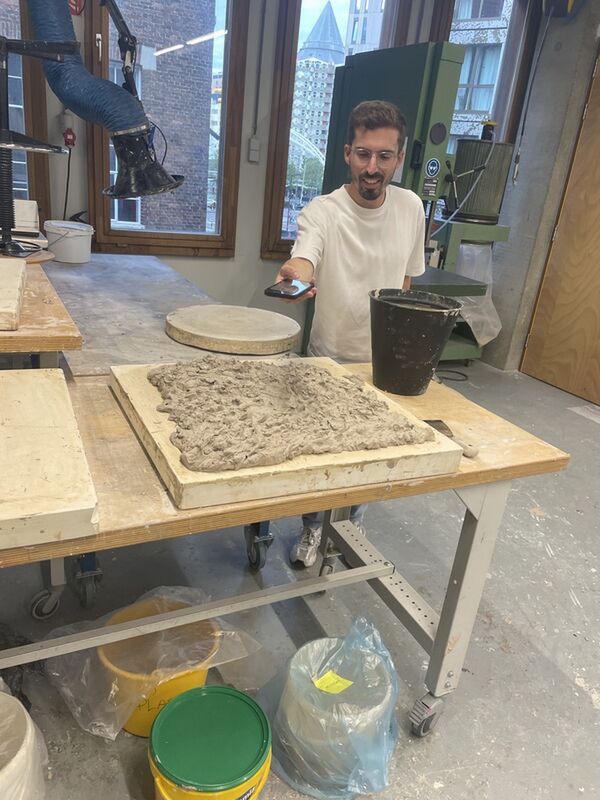
reclaiming clay at the ceramics station
Eternal records
The first clay tablet was created as a joke, referring to a meme that surfaced on the internet. "the oldest bar joke in the world". The humor in the joke is a subject of debate, as linguistical nuances and cultural undestandings have faded, rendering the presumed joke rather mundane in the 21st century.
An interesting aspect of archives to address, is the fact that most common data-storage devices are relatively short lived. In the age of information a vast majority of data is stored digitally in one form and other. It might be easy to forget that these mediums too have materiality, as we rarely directly interact with these devices, usually you need som sort of interface or interpreter like a computer or a disc-player.
The lifetime of different contemporary media varies, but they do not live forever. Take for an instance the hard disk drive, a device that stores data on spinning magnetic discs. Since they contain lots of moving parts, they are quite prone to deuteration over time, and one can expect a HDD to last a mere 3-5 years. The Solid State Drive, a more modern relative of the HDD, does not contain moving parts. Instead the SSD stores data via electrical signals on transistors. Thus you can expect it to last roughly 10 years. In fact none of the more recent ways of keeping records have a lifespan of more than a couple of decades at best. To work around this, modern archives are reliant on backups and copies in order to ensure that the data is safe.
read more on different data storage media here: https://www.arcserve.com/blog/data-storage-lifespans-how-long-will-media-really-last
Therefore if you want to make a record that is intended to last for lets say for centuries or even millennia, you will need a simpler and more durable way to encode the data. The best way to keep a record, or make a publication so that it will endure the tooth of time, is to either use paper or stone. An acid free paper with ink/print/scripture that is not prone to fading is a possible approach. Another way is to learn from ancient civilisations, and turn to stoneware tablets with the information imprinted in the material. Findings of such tablets are the reason we have insights in proverbs from the birth of society.
In order to interrogate this further recreations of said clay tablets have been made. Maybe this could help us gain insight in how such craftful and "primitive" could be applied in a contemporary setting. A tablet could be made with a flattened piece of clay, and a pointed object like a needle to engrave the information.
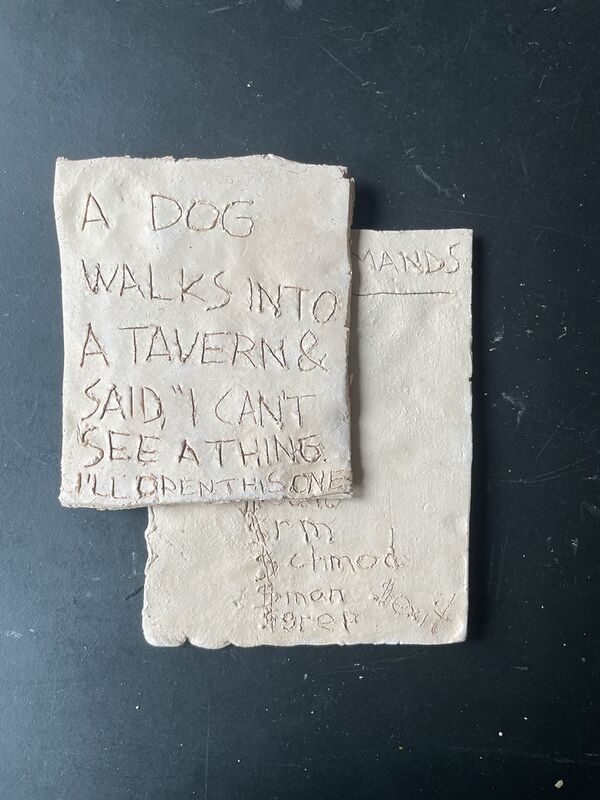
The first to clay tablets fired
Eternal notes
After the initial tablets were created during SI22, I had a sensation that I wanted to keep exploring making "clay publications". After SI22 I noticed my frustration with the copious amounts of notes scattered on pads, wiki-pages, papers and notebooks. My un-ability to manage to gather notes at the end of the week (or some other structured manner) filled me a dread for th future when this material may be relevant. As a reaction to this I imposed a rule on myself to make a tablet a week, a symbolic gesture to impose some sort of continuity. to the best of my ability I (semi)followed-through and now have a lot of unfired tablets of "wisdom."
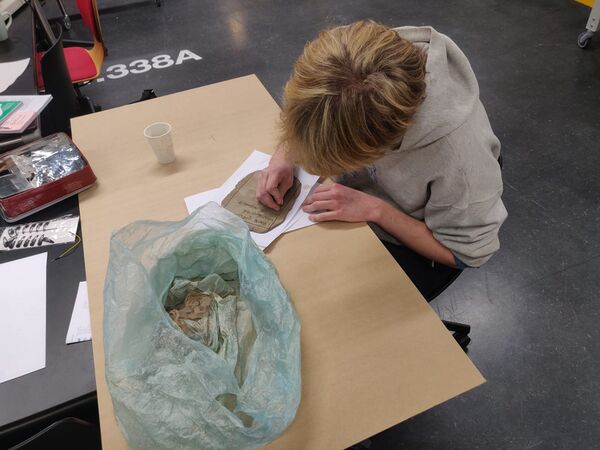
The making of a clay tablet
The tablets were created in a "primitive"("low"-tech) manner. flattening the clay by hand and using a needle to engrave the letters. The clay also needs to be regularly moisturized and kneded in order to achieve the best consistency for table-making. After they are thoroughly dried, they are to be fired at 1030 (as this is reclaimed clay we cannot be sure that it would withstand higher firing).
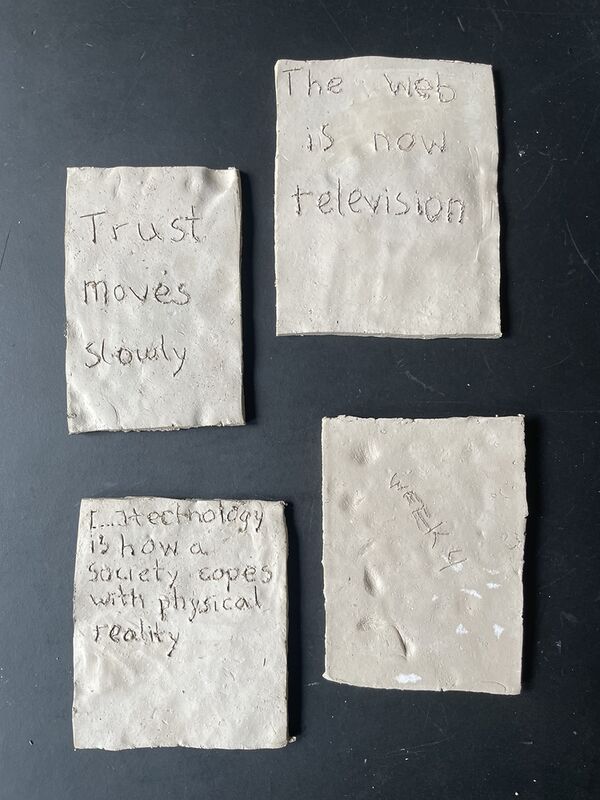
clay tablets with notes from class, dated on the back
The notes on the tablets are encoded with intentionally contextual and ephemeral quotes/statements. This says something about how letter arranged in a system, does not convey meaning by itself, for that it needs cultural, societal and political context. just like how we can't fully understand the "ancient bar joke" the eternal notes are situated and intrapersonal.
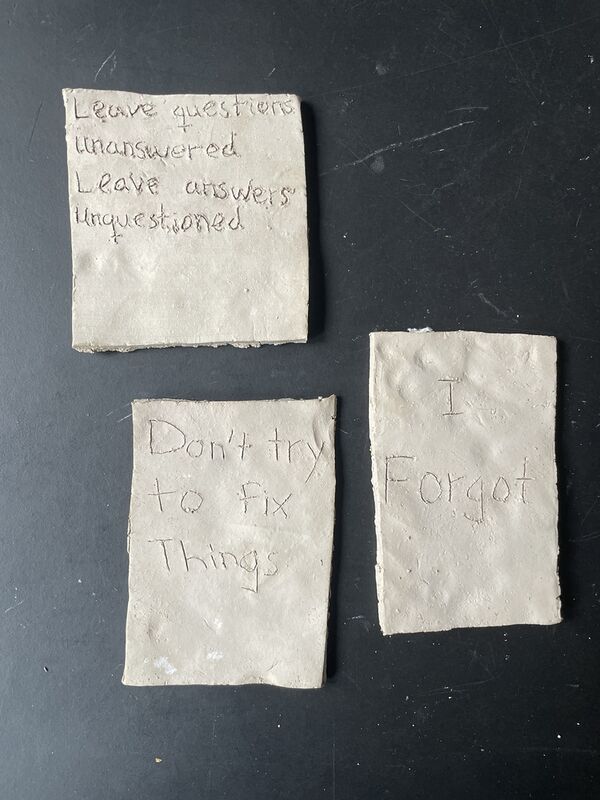
Another aspect of the clay-tablet-format that intrigues me is their supposed longevity. The oldest records of literature known to the world are clay tablet from Mesopotamia, and I think it's amazing that we today can read translations of Sumerian and Assyrian records. There are records containing medicinal knowledge, laws, religious text, magic texts, a testimony to these ancients civilizations entanglement with informational communicational technologies. It is important to note that these tablets implied power and control, and on should always be sceptical to documents that governs people freedom of movement and so on.
A great place to get familiarized with this ancient "wisdom" are the "instructions of Shrupagg" >> https://earth-history.com/Sumer/instructions-%20shuruppag.htm << For some context these are instructions given from some mythical character to another in Sumerian Lore(religon orwhatever), and can be understood as a predecessor to the 10 commandments present in the abrahamic religions.
>> https://earth-history.com/Sumer/proverbs.htm << is a collection of Sumerian proverbs also highly reccomend.
Some of my top pics. from these 4000 year old wisdoms:
- You should not pass judgment when you drink beer.
- You should not drive away a debtor: he will be hostile towards you.
- You should not have sex with your slave girl: she will chew you up (?).
- Wealth is hard to come by, but poverty is always at hand.
- He who drinks too much beer must drink water.
- The fox, having urinated into the sea, said at the whole of the sea is my urine.

